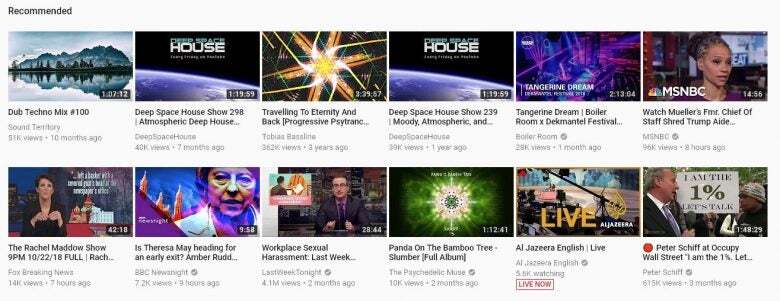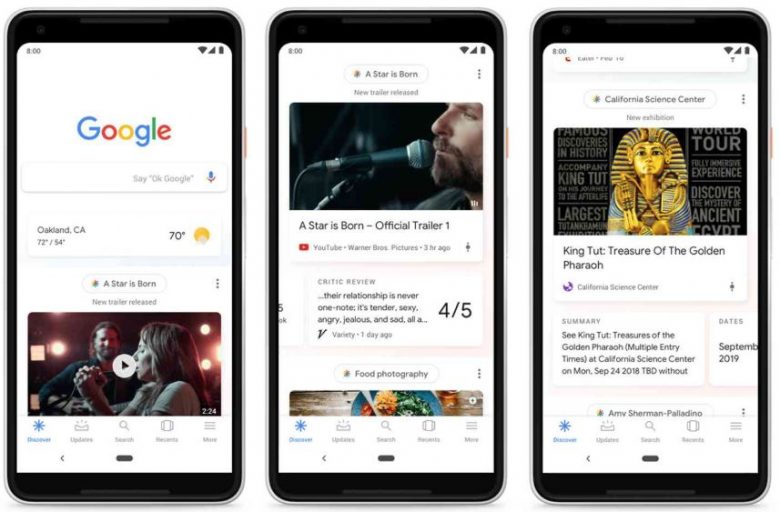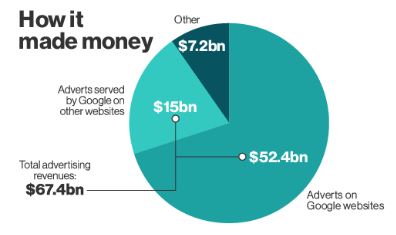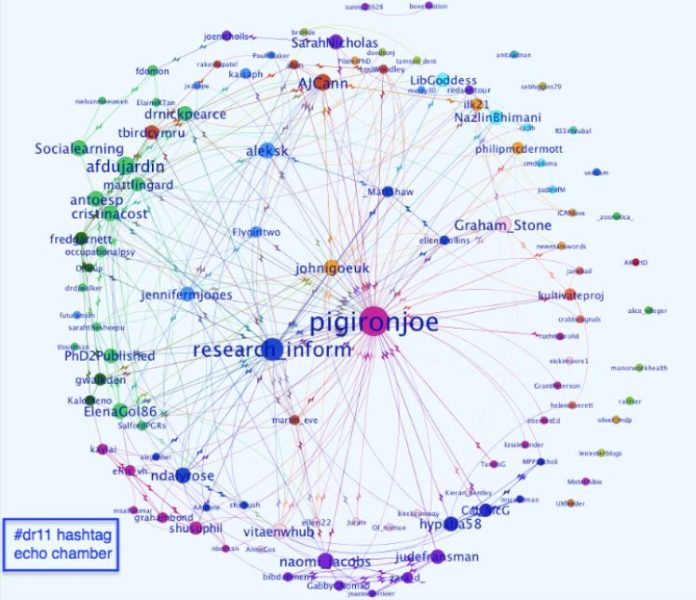What does Google Discover mean for brands and their content marketing?
So you’ve heard about Google Discover and you want to know what this means for your business, brand or agency. You want to know: what are the opportunities? And how to exploit them? Well, you clicked on the right link.
Simply, what is Google Discover?
The Google homepage on mobile will display personalised content from Oct/Nov 2018. Content will be presented based on what Google knows about individuals. It will also allow individuals to customise their settings to help guide what they’re shown. This is essentially the renaming and relaunching of Google Feed which personalises news for people but will doubtless include new features. Read Google’s blog on Discover here.
Just as YouTube recommends videos based on your viewing habits, so Google will use a broader range of data points on your web behaviour, to recommend content to you.

YouTube knows that I follow left-leaning US news and have terrible taste in music.
Google Discover: ‘pushing’ the ‘pull’
What does this mean? Marketers often use the phrase ‘push marketing’ to describe ‘active’ marketing which pushes messages to people where they are when they’re not actively looking for your brand (radio/TV/print ads, pre-roll video, Facebook ads). ‘Pull’ marketing is more passive, making sure you are visible when someone IS looking for the thing you do or sell (SEO, aspects of content marketing).
Digital marketers use data (often from Google) to find out what specific audiences want, to help define content for both push and pull activity. This is done to get a given brand in front of a given audience.
Google Discover will now use these principles to create a dynamic digital content feed that uses data on an individuals’ behaviour to decide what content they are most likely to engage with.
What data could be in the mix?
What data will Google use to select your content? SEOs and content marketers will have a pretty good guess at what will be in the mix. Not just from the data and tools publicly available, but from data Google has that marketers would love to get their hands on. We imagine it will include, but probably isn’t limited to:
- Search history (including voice)
- Browsing history
- Including dwell time (what does a person find the most engaging content)
- Format (video, text, audio preferences)
- Social media and social listening
- The content individuals share and/or interact with on social media
- Google shopping (what they’re buying and/or looking to buy)
- Location (where people are and what hyper-local content/services may be useful/entertaining)
- Gmail (Google is able to scour your Gmail for keywords and may use these to guide what content it serves you)
- The contents of Google Docs
- Think about the data fiasco that Facebook found themselves in, in 2018. Imagine how much data Google has about you… All of that could be in the mix when suggesting what you see on your Google Discover.
While content marketers have access to aspects of this, they don’t have the power of Google’s algorithm to crunch all that data and make it personalised to every user.

Personalisation
As well as the algorithms and artificial intelligence beavering away, Google will allow individuals to customise their feed:
“Just tap on the control icon to indicate that you want more or less content on that topic. You’ll continue to see content from a range of sources on any given topic, helping you explore new ideas surrounding your interests.”
While this is pretty straightforward, it will be interesting to know how Google subsequently use this data (personal preferences) to improve the algorithms even further – especially whether it can learn more complex behavioural differences between ‘types’ of people and their interests. For example: do those interested in hockey, consume more content than those interested in cricket? Is the content longer form? Do they engage more frequently? Do they like interviews over scores? And how do sports enthusiasts’ content consumption behaviour and patterns compare to those with an interest in music or fishing?
I am most interested to see if Google Discover can manage depth of interest. Can it learn how much content you want and of what ‘intensity’? For example: do you want a new pop song every day or one massive Bruce Springsteen interview a month? Or do you want both of those things? Or just one pop song once a month and an in-depth musician interview every day?! And can the Google AI tell the difference?
Motivation: why are Google doing this?
In the early-00s sites such as Yahoo, Tiscali and MSN were people’s ‘front page of the internet’ – a news feed, email login and search engine. By the mid-00s social media had replaced these – people’s social accounts becoming their homepages. Reddit is the self-appointed front page of the internet.
For many users, Google is the front page of the internet, the start of most online journeys. It’s also the go-to site that supplements billions of other journeys already underway. Google Discover will turn Google from a tool, into a broadcaster, a media outlet – the new front page of the internet.
They say: “Think of it as your new mobile homepage where you can not only search, but also discover.”
But why? Why would Google become something that no one is demanding and has been proven to be ‘a thing of the past?’. Their mission has always been to deliver the “most relevant, highest quality information”. In the past they’ve done this when users search, now they’ll it proactively, saying “our goal to help you uncover fresh and interesting content about things that matter to you.”
Mission, schmission. What’s the real reason? What’s the commercial reason?
How will Google Discover make money?
First, how does Google currently make money?

Courtesy: BBC
Initially, it seems that the only way Google Discover could drive more traffic to websites it serves ads on (via Adsense). But do Google have other longer-term revenue streams in mind? Will ads eventually be served in Discover? Probably. Why wouldn’t you? What would brands pay for a story or ad on the front page of the internet? Also, history shows that while things such as search engines, social media and other servicers start out as free and/or non-commercialised they inevitably have to charge or accept increasingly invasive advertising.
But hey, with an operating profit of $23bn, maybe they just thought they’d do something new, interesting, altruistic, helpful.
Of course, it remains to be seen whether people will use Discover and it will, of course, take some time – whether short or long – for people to adopt it, if they do.
Measurement and reporting
It will be interesting to see how Google reports on the performance of Discover – if it does at all. Will we be able to see the power of being on Discover? And will we be able to see the power of the various aspects of it? Ie: does being top drive the most traffic? Or does video content always perform best? We will wait to see whether this is a variable within Google Search Console or Google Analytics.
Just as SEOs and content marketers work to define what makes something rank in search, so too will we have to work to define why things get selected for Discover.
Will Google Discover be an echo chamber?
Algorithms are good at giving you more of what you like, but they’re still not great at predicting what you will like. Netflix has already cleverly not include ratings on its platform, but recommends shows with a % appropriateness based on your watching habits (this is also improved by people rating shows as they go).
But this assumes that people’s tastes don’t change and makes it hard for things on the fringes of people’s interests to be represented.
Social media – and in particular Facebook – has been criticised for creating echo chambers: an eternal feedback loop in which people like something, click on it, and are therefore fed more of the same. After it was revealed that Russia interfered with the US 2016 election by pushing ‘fake news’ via fake accounts and legitimate means (Facebook ads/boosted posts) the darker revelation was that people could be ensnared in a ‘race to the bottom’ with increasingly right/left wing views accepted and even shared.

A map of an echo chamber – information and traffic travelling in a closed loop
Reassuringly, Google says: “Discover uses the same technology as Full Coverage in Google News to bring you a variety of perspectives on the latest news.” So we can look forward to seeing Fox, MSNBC, Young Turks and NPR in our feeds.
Even this doesn’t factor in that some people want new and different things, while others want more of the same. Maybe Google will learn which one of these we are – our appetite for breadth and the new.
Ideally, Google’s AI will be able to cope with the complexity of humans and reflect and cater to their differences, rather than create lowest common denominator, one-size-fits-all clickbait content. Hope springs eternal, Baldrick…
The opportunity for brands and marketers
Just as marketers of all hat colours attempt to learn what gets content on page one of Google, so too will we try to determine what gets an article into Google Discover. In fact, it will doubtless become the obsession of the industry – imagine the brand awareness value of a story in Google Discover! It would be like being the lead story on the front page of every newspaper in the 1970s!
For all my cynicism, Google’s algorithm changes are a constant reminder that the company does live by its aforementioned mission: to provide the “most relevant, highest quality information”. So these will doubtless be the guiding principles for Google Discover.
This, really, is the short answer to ‘how do I get my content on Google Discover?’: make your content high-quality and highly relevant to your target audience.
Entertainment and interest
Most of the content people consume is for entertainment, even if it’s informational as well – news, interests. Many brands already create lifestyle content in an effort to build relationships with audiences who may not be interested in their products directly or constantly. This content usually sits at the top of the funnel – raising awareness. Google Discover will open up new opportunities for brands to get in front of audiences who aren’t actively looking for them but may enjoy the content they produce – the ‘pull’ content, that’s ‘pushed’.
Niche interests and passion pockets
Inside this, we predict that Google Discover will be great for niche interests, topics that it may already be difficult to find content on because it’s created by and covered by small operations and not large corporates. If your web activity shows that you’re interested in JDM (Japanese Domestic Market cars), early ‘90s pre-jungle hardcore or the history of the Paston Library, you may find that Google is better at finding relevant content than you are. You’re just one petrolhead, rave-nerd or literary historian, but Google knows everything about you and ‘your kind’. This will give brands new opportunities to reach small sub-segments of their wider audiences by creating hyper-targeted content – especially that based on longtail searches where little content already exists.
Breaking news
Google Discover will allow brands expanded value in PR and news. Few brands will manage to get their survey, report, announcement on the BBC or other major news outlets and they’re far less visible in the niche publications of industry and specific interests. But with Google Discover searching out the most relevant content from the entire web, it will be able to put your news in front of relevant audiences – whether it was covered by the Washington Post of the Clay Pigeon Association’s monthly magazine, Pull!.
Summary
Beyond these three opportunities, a key thing to remember is, what does Google reward? “The most relevant, highest quality information”. If you can create this, you’ll be on the right track.
Many Google algorithm updates can be bumpy as they correct and dial and finesse them, and we predict that Discover will take a few weeks/months to fine-tune – especially as the customisation data is reused to make a better service.
Want to learn more about Google Discover and what it means for your brand and content strategies? Contact us here or email hello@www.gravityglobal.com.


